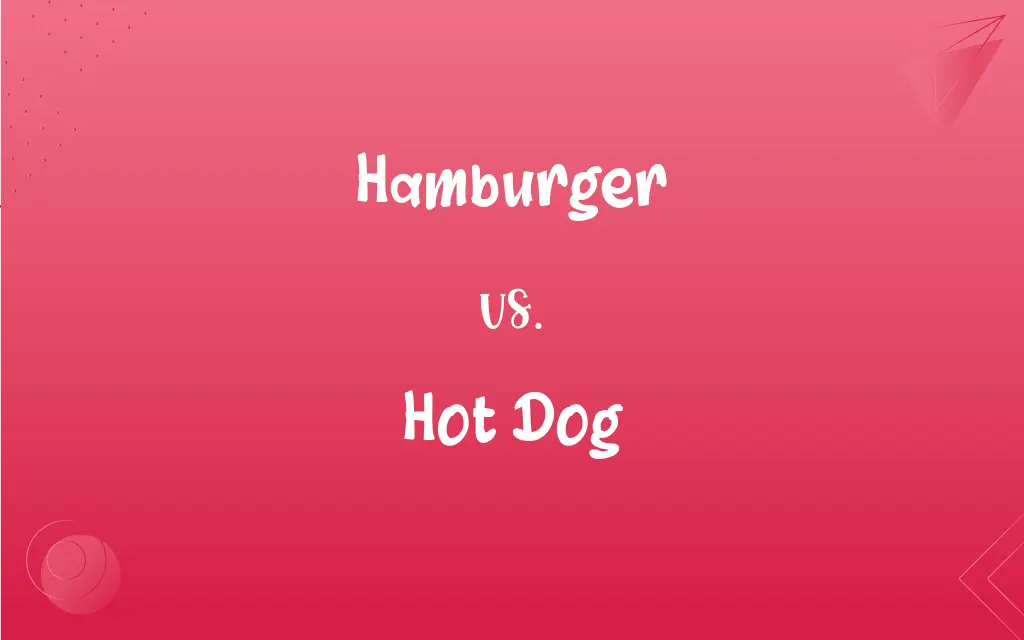Hamburger vs. Hot Dog: What's the Difference?
Edited by Aimie Carlson || By Harlon Moss || Published on October 13, 2024
A hamburger is a sandwich with a ground beef patty between buns, while a hot dog is a cooked sausage served in a slit bun.

Key Differences
Hamburgers and hot dogs represent quintessential American fast food, each with a distinct place in culinary culture. A hamburger consists of a ground beef patty, often seasoned and cooked to varying degrees of doneness, placed between two halves of a bun. Toppings can include lettuce, tomato, onion, pickles, cheese, and condiments such as ketchup, mustard, and mayonnaise. On the other hand, a hot dog consists of a grilled or steamed sausage made from beef, pork, or a combination thereof, served in a slit bun. Hot dog condiments can include mustard, ketchup, mayonnaise, relish, onions, and sauerkraut, reflecting a wide range of regional variations.
The origin of hamburgers is widely attributed to German immigrants bringing their culinary traditions to America, with the hamburger gaining popularity at the 1904 St. Louis World's Fair. Hot dogs trace their lineage to European sausages, with the American hot dog (frankfurter or wiener) becoming a staple at baseball parks and street vendors in the late 19th and early 20th centuries. Both hamburgers and hot dogs have evolved to include a variety of recipes and styles, reflecting the diverse tastes and preferences of the American public.
Culinary techniques for hamburgers and hot dogs differ, with hamburgers typically grilled or pan-fried, allowing for variations from rare to well-done. Hot dogs, meanwhile, are boiled, steamed, or grilled, with the emphasis on achieving a juicy, flavorful interior within a firm, slightly crispy exterior. The bun plays a crucial role in both, with hamburger buns being soft yet sturdy enough to hold the patty and condiments, while hot dog buns are elongated and softer, designed to cradle the sausage snugly.
Hamburgers are often seen as a meal in themselves, served with sides like fries or a salad, reflecting a broader range of dining occasions from fast food to gourmet experiences. Hot dogs, while also versatile, are commonly associated with casual snacking or quick meals, especially at outdoor events, fairs, and sports games. The cultural significance of hamburgers and hot dogs extends beyond their taste, symbolizing American innovation, convenience, and the blending of various culinary traditions into something uniquely American.
Despite their common classification as fast food, hamburgers and hot dogs offer distinctly different eating experiences. Hamburgers can be customized with a wide variety of toppings and bread options, catering to a diverse palate. Hot dogs, while simpler, boast a unique flavor profile enhanced by the choice of sausage and a specific set of condiments, highlighting the importance of tradition and regional preferences in their preparation and enjoyment.
ADVERTISEMENT
Comparison Chart
Main Ingredient
Ground beef patty
Cooked sausage (beef, pork, or both)
Bun Type
Round, split bun
Long, slit bun
Cooking Method
Grilled or pan-fried
Boiled, steamed, or grilled
Common Toppings
Lettuce, tomato, onion, cheese, pickles
Mustard, ketchup, onions, relish
Cultural Origin
German immigrants in America
European sausages adapted in America
ADVERTISEMENT
Serving Occasion
Meals, casual to gourmet dining
Snacks, casual dining, outdoor events
Variety
Wide variety of toppings and styles
Limited variety, regional variations
Symbolism
American culinary innovation
Convenience and tradition
Customization
Highly customizable
Less customizable
Culinary Tradition
Broad, adaptable
Specific, with established variations
Hamburger and Hot Dog Definitions
Hamburger
An iconic American food, symbolizing fast, satisfying meals.
Nothing beats a hamburger and fries for a quick, delicious dinner.
Hot Dog
Synonymous with baseball games and outdoor events.
Nothing says baseball like enjoying a hot dog in the stands.
Hamburger
A sandwich featuring a ground beef patty between buns.
I ordered a classic hamburger with cheese and bacon for lunch.
Hot Dog
A quick, easy-to-eat meal available at stands and restaurants.
When I'm in a hurry, I often pick up a hot dog from the corner stand.
Hamburger
A meal commonly cooked on a grill, known for its charred flavor.
Our backyard barbecue isn't complete without grilling hamburgers.
Hot Dog
A cooked sausage served in a slit bun, often with condiments.
At the game, I grabbed a hot dog with mustard and relish.
Hamburger
A versatile dish that can be customized with various toppings.
She loves her hamburger loaded with avocado and spicy mayo.
Hot Dog
A simple, beloved food that evokes nostalgia.
A hot dog with sauerkraut takes me back to my childhood summers.
Hamburger
A sandwich centered around a juicy ground beef patty.
The restaurant's signature hamburger features a half-pound beef patty.
Hot Dog
Often grilled, giving it a smoky flavor.
We love grilling hot dogs at our summer beach bonfires.
Hamburger
Ground meat, usually beef.
Hot Dog
To perform daring stunts or acrobatic maneuvers, as while skiing or surfing.
Hot Dog
Alternative spelling of hot dog
FAQs
How are hamburgers cooked?
They can be grilled, pan-fried, or broiled, usually until browned and cooked to desired doneness.
What kind of meat is in a hot dog?
Hot dogs can be made from beef, pork, turkey, chicken, or combinations thereof.
What is a hot dog?
A cooked sausage served in a slit bun, typically with condiments like mustard and ketchup.
What makes a hot dog a "Chicago-style" hot dog?
A Chicago-style hot dog is typically topped with mustard, onion, sweet pickle relish, a dill pickle spear, tomato slices, pickled sport peppers, and celery salt.
Can hamburgers be made with meats other than beef?
Yes, hamburgers can also be made with turkey, chicken, lamb, or plant-based proteins.
What are common toppings for a hamburger?
Common toppings include lettuce, tomato, onion, pickles, cheese, ketchup, mustard, and mayo.
Are hot dogs unhealthy?
While hot dogs are often high in sodium and saturated fats, they can be enjoyed in moderation as part of a balanced diet.
What is a hamburger?
A sandwich with a ground beef patty between two halves of a bun, often with various toppings.
Is it possible to eat a hamburger without a bun?
Yes, hamburgers can be eaten without a bun, often as part of low-carb or gluten-free diets, and are sometimes served with lettuce wraps.
What is the origin of the hamburger?
The hamburger has roots in German culinary traditions, adapted by German immigrants in the United States.
What is the best way to cook a hamburger?
Preferences vary, but many consider grilling the best method for flavor and juiciness.
Where did the hot dog originate?
The hot dog evolved from European sausages, becoming a popular American food in the late 19th century.
Can hamburgers be considered healthy?
Hamburgers can be part of a balanced diet, especially when made with lean meat and topped with vegetables.
What's a common mistake when cooking hot dogs?
Overcooking hot dogs can make them split and lose flavor; gentle heating is key to keeping them juicy.
Are there vegetarian options for hot dogs?
Yes, there are vegetarian and vegan hot dogs made from plant-based ingredients.
What's the best way to cook a hot dog?
Hot dogs can be boiled, grilled, or steamed, with grilling providing a smoky flavor.
Can you customize a hot dog?
Yes, hot dogs can be customized with a variety of toppings and condiments to suit individual tastes.
What's a unique way to serve hamburgers?
Serving hamburgers with exotic toppings or using alternative meats like bison or lamb can offer a unique twist.
What's a common mistake when cooking hamburgers?
Overworking the meat or pressing down on the patties while grilling can lead to dry, tough burgers.
How are hot dogs traditionally served?
Traditionally, hot dogs are served in a soft bun with condiments like mustard, ketchup, onions, and relish.
About Author
Written by
Harlon MossHarlon is a seasoned quality moderator and accomplished content writer for Difference Wiki. An alumnus of the prestigious University of California, he earned his degree in Computer Science. Leveraging his academic background, Harlon brings a meticulous and informed perspective to his work, ensuring content accuracy and excellence.
Edited by
Aimie CarlsonAimie Carlson, holding a master's degree in English literature, is a fervent English language enthusiast. She lends her writing talents to Difference Wiki, a prominent website that specializes in comparisons, offering readers insightful analyses that both captivate and inform.






































































